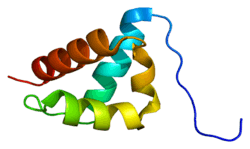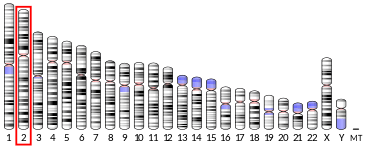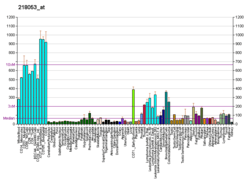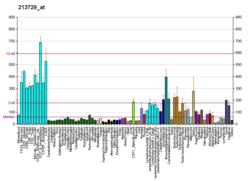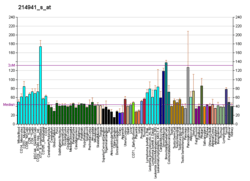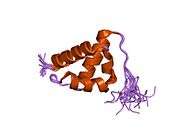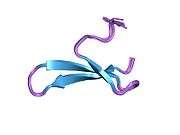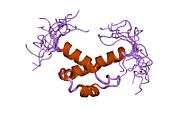PRPF40A
Pre-mRNA-processing factor 40 homolog A is a protein that in humans is encoded by the PRPF40A gene.[5][6][7]
Interactions
PRPF40A has been shown to interact with Huntingtin.[8]
gollark: ?remind 3y Execute Contingency Theta.
gollark: I'm in school year 11, and am doing something like 11 GCSEs for some annoying reason; exams are in 6-ish months.
gollark: The UK's... high school-equivalent?... qualification thingies.
gollark: General Somethingsomething Exams.
gollark: Fascinating.
References
- GRCh38: Ensembl release 89: ENSG00000196504 - Ensembl, May 2017
- GRCm38: Ensembl release 89: ENSMUSG00000061136 - Ensembl, May 2017
- "Human PubMed Reference:". National Center for Biotechnology Information, U.S. National Library of Medicine.
- "Mouse PubMed Reference:". National Center for Biotechnology Information, U.S. National Library of Medicine.
- Bedford MT, Reed R, Leder P (September 1998). "WW domain-mediated interactions reveal a spliceosome-associated protein that binds a third class of proline-rich motif: the proline glycine and methionine-rich motif". Proc Natl Acad Sci U S A. 95 (18): 10602–7. Bibcode:1998PNAS...9510602B. doi:10.1073/pnas.95.18.10602. PMC 27941. PMID 9724750.
- Wiesner S, Stier G, Sattler M, Macias MJ (December 2002). "Solution structure and ligand recognition of the WW domain pair of the yeast splicing factor Prp40". J Mol Biol. 324 (4): 807–22. doi:10.1016/S0022-2836(02)01145-2. PMID 12460579.
- "Entrez Gene: PRPF40A PRP40 pre-mRNA processing factor 40 homolog A (S. cerevisiae)".
- Faber, P W; Barnes G T; Srinidhi J; Chen J; Gusella J F; MacDonald M E (September 1998). "Huntingtin interacts with a family of WW domain proteins". Hum. Mol. Genet. 7 (9): 1463–74. doi:10.1093/hmg/7.9.1463. ISSN 0964-6906. PMID 9700202.
Further reading
- Chan DC, Bedford MT, Leder P (1996). "Formin binding proteins bear WWP/WW domains that bind proline-rich peptides and functionally resemble SH3 domains". EMBO J. 15 (5): 1045–54. doi:10.1002/j.1460-2075.1996.tb00442.x. PMC 450002. PMID 8605874.
- Bedford MT, Chan DC, Leder P (1997). "FBP WW domains and the Abl SH3 domain bind to a specific class of proline-rich ligands". EMBO J. 16 (9): 2376–83. doi:10.1093/emboj/16.9.2376. PMC 1169838. PMID 9171351.
- Faber PW, Barnes GT, Srinidhi J, et al. (1998). "Huntingtin interacts with a family of WW domain proteins". Hum. Mol. Genet. 7 (9): 1463–74. doi:10.1093/hmg/7.9.1463. PMID 9700202.
- Scanlan MJ, Gordan JD, Williamson B, et al. (1999). "Antigens recognized by autologous antibody in patients with renal-cell carcinoma". Int. J. Cancer. 83 (4): 456–64. doi:10.1002/(SICI)1097-0215(19991112)83:4<456::AID-IJC4>3.0.CO;2-5. PMID 10508479.
- Bedford MT, Sarbassova D, Xu J, et al. (2000). "A novel pro-Arg motif recognized by WW domains". J. Biol. Chem. 275 (14): 10359–69. doi:10.1074/jbc.275.14.10359. PMID 10744724.
- Zhang QH, Ye M, Wu XY, et al. (2001). "Cloning and functional analysis of cDNAs with open reading frames for 300 previously undefined genes expressed in CD34+ hematopoietic stem/progenitor cells". Genome Res. 10 (10): 1546–60. doi:10.1101/gr.140200. PMC 310934. PMID 11042152.
- Wenzel J, Sanzenbacher R, Ghadimi M, et al. (2002). "Multiple interactions of the cytosolic polyproline region of the CD95 ligand: hints for the reverse signal transduction capacity of a death factor". FEBS Lett. 509 (2): 255–62. doi:10.1016/S0014-5793(01)03174-X. PMID 11741599.
- Allen M, Friedler A, Schon O, Bycroft M (2002). "The structure of an FF domain from human HYPA/FBP11". J. Mol. Biol. 323 (3): 411–6. doi:10.1016/S0022-2836(02)00968-3. PMID 12381297.
- Strausberg RL, Feingold EA, Grouse LH, et al. (2003). "Generation and initial analysis of more than 15,000 full-length human and mouse cDNA sequences". Proc. Natl. Acad. Sci. U.S.A. 99 (26): 16899–903. Bibcode:2002PNAS...9916899M. doi:10.1073/pnas.242603899. PMC 139241. PMID 12477932.
- Katoh M, Katoh M (2004). "Identification and characterization of human FNBP3 gene in silico". Int. J. Mol. Med. 12 (4): 651–6. doi:10.3892/ijmm.12.4.651. PMID 12964049.
- Busino L, Donzelli M, Chiesa M, et al. (2003). "Degradation of Cdc25A by beta-TrCP during S phase and in response to DNA damage". Nature. 426 (6962): 87–91. Bibcode:2003Natur.426...87B. doi:10.1038/nature02082. PMID 14603323.
- Mizutani K, Suetsugu S, Takenawa T (2004). "FBP11 regulates nuclear localization of N-WASP and inhibits N-WASP-dependent microspike formation". Biochem. Biophys. Res. Commun. 313 (3): 468–74. doi:10.1016/j.bbrc.2003.11.139. PMID 14697212.
- Ota T, Suzuki Y, Nishikawa T, et al. (2004). "Complete sequencing and characterization of 21,243 full-length human cDNAs". Nat. Genet. 36 (1): 40–5. doi:10.1038/ng1285. PMID 14702039.
- Beausoleil SA, Jedrychowski M, Schwartz D, et al. (2004). "Large-scale characterization of HeLa cell nuclear phosphoproteins". Proc. Natl. Acad. Sci. U.S.A. 101 (33): 12130–5. Bibcode:2004PNAS..10112130B. doi:10.1073/pnas.0404720101. PMC 514446. PMID 15302935.
- Jin J, Smith FD, Stark C, et al. (2004). "Proteomic, functional, and domain-based analysis of in vivo 14-3-3 binding proteins involved in cytoskeletal regulation and cellular organization". Curr. Biol. 14 (16): 1436–50. doi:10.1016/j.cub.2004.07.051. PMID 15324660.
- Goehler H, Lalowski M, Stelzl U, et al. (2004). "A protein interaction network links GIT1, an enhancer of huntingtin aggregation, to Huntington's disease". Mol. Cell. 15 (6): 853–65. doi:10.1016/j.molcel.2004.09.016. PMID 15383276.
- Lin KT, Lu RM, Tarn WY (2004). "The WW domain-containing proteins interact with the early spliceosome and participate in pre-mRNA splicing in vivo". Mol. Cell. Biol. 24 (20): 9176–85. doi:10.1128/MCB.24.20.9176-9185.2004. PMC 517884. PMID 15456888.
- Gerhard DS, Wagner L, Feingold EA, et al. (2004). "The status, quality, and expansion of the NIH full-length cDNA project: the Mammalian Gene Collection (MGC)". Genome Res. 14 (10B): 2121–7. doi:10.1101/gr.2596504. PMC 528928. PMID 15489334.
This article is issued from Wikipedia. The text is licensed under Creative Commons - Attribution - Sharealike. Additional terms may apply for the media files.
